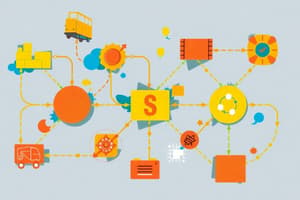Podcast
Questions and Answers
What is the primary goal of Customer Relationship Management (CRM)?
What is the primary goal of Customer Relationship Management (CRM)?
- To manage customer relationships based on their individual needs and value (correct)
- To maximize customer acquisition costs
- To eliminate the need for customer feedback
- To treat customers similarly regardless of their needs
Which of the following is a benefit of operational Customer Relationship Management systems?
Which of the following is a benefit of operational Customer Relationship Management systems?
- Access to a 360-degree view of each customer (correct)
- Enhanced social media presence
- Increased customer acquisition costs
- Reduction in customer interaction history
What does data consolidation using a data warehouse enable in CRM?
What does data consolidation using a data warehouse enable in CRM?
- Segmentation of customer databases into isolated groups
- Collaboration and a comprehensive customer view (correct)
- Limited access to customer information
- Increased data redundancy
How do customer-facing applications in CRM benefit an organization?
How do customer-facing applications in CRM benefit an organization?
What does the term 'customer churn' refer to in CRM?
What does the term 'customer churn' refer to in CRM?
Which feature distinguishes high-end CRM systems from low-end CRM systems?
Which feature distinguishes high-end CRM systems from low-end CRM systems?
What is a key aspect of customer identity management within CRM?
What is a key aspect of customer identity management within CRM?
Why is customer intimacy important in CRM?
Why is customer intimacy important in CRM?
What distinguishes customer-facing applications from customer-touching applications?
What distinguishes customer-facing applications from customer-touching applications?
Which of the following is an example of upselling?
Which of the following is an example of upselling?
What type of CRM system allows continuous access to customers and prospects via mobile devices?
What type of CRM system allows continuous access to customers and prospects via mobile devices?
Which flow in a supply chain relates specifically to the management of goods and materials?
Which flow in a supply chain relates specifically to the management of goods and materials?
What are the primary segments of a supply chain?
What are the primary segments of a supply chain?
Which tier in a supply chain is responsible for providing the most basic products?
Which tier in a supply chain is responsible for providing the most basic products?
Which of the following best describes reverse logistics in supply chain management?
Which of the following best describes reverse logistics in supply chain management?
Which component in supply chains relates to the flow of funds and financial transactions?
Which component in supply chains relates to the flow of funds and financial transactions?
What is the primary function of Customer Relationship Management (CRM)?
What is the primary function of Customer Relationship Management (CRM)?
Which of the following describes operational CRM systems?
Which of the following describes operational CRM systems?
What are the three key components of a supply chain?
What are the three key components of a supply chain?
Which strategy can be used to overcome supply chain challenges?
Which strategy can be used to overcome supply chain challenges?
Which technology supports supply chain management by enabling real-time communication among partners?
Which technology supports supply chain management by enabling real-time communication among partners?
What is a disadvantage of mobile CRM systems?
What is a disadvantage of mobile CRM systems?
How does collaborative CRM differ from operational CRM?
How does collaborative CRM differ from operational CRM?
What flow does information technology support in supply chain management?
What flow does information technology support in supply chain management?
Study Notes
Customer Relationship Management (CRM)
- CRM focuses on treating customers according to their needs and company value.
- Key concepts include customer intimacy, lifetime value, and customer churn.
- Differentiates strategies from systems, emphasizing low-end vs. high-end CRM systems.
- Customer touch points facilitate interaction between businesses and customers.
- Data consolidation through a data warehouse offers a 360-degree view of customers and supports collaborative CRM.
Operational CRM Systems
- Operational CRM systems enhance front-office processes through customer-facing and customer-touching applications.
- Benefits include efficient marketing, sales, personalized service, and a complete history of customer interactions.
- Provides sales and service employees access to comprehensive customer interaction data.
Types of CRM Systems
- On-demand CRM (SaaS) offers utility computing capabilities, enabling flexibility and scalability.
- Mobile CRM systems allow access to CRM functionalities on-the-go.
- Open-source CRM systems encourage customization and community support.
- Social CRM systems integrate social media interactions into customer relationship strategies.
- Real-time CRM enables immediate response to customer interactions.
Supply Chains
- Supply chains involve networks connecting suppliers, manufacturers, and consumers.
- Visibility in supply chains relies on inventory velocity, tracking product movement efficiently.
Structure of Supply Chains
- Comprised of upstream, internal, downstream, and reverse logistics components.
- Upstream involves sourcing raw materials, internal covers production, and downstream connects to the end consumer.
Components and Flows in Supply Chains
- Tiers of suppliers include Tier 1 (integrated components), Tier 2 (sub-assemblies), and Tier 3 (basic products).
- Material, information, and financial flows are essential for efficient supply chain operations.
Strategic Advantages
- Effective CRM strategies drive customer satisfaction and retention, reducing churn.
- Supply chain strategies aim to address challenges through efficient inventory and resource management.
Technologies Supporting Supply Chain Management
- Technologies in supply chain management include analytics, tracking systems, and inventory management tools.
Studying That Suits You
Use AI to generate personalized quizzes and flashcards to suit your learning preferences.
Related Documents
Description
Explore the key concepts of Customer Relationship Management (CRM) and Supply Chain Management in this quiz based on Chapter 11 of the Introduction to Information Systems. Understand the primary functions and applications of collaborative CRM strategies in businesses.




